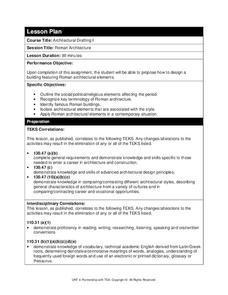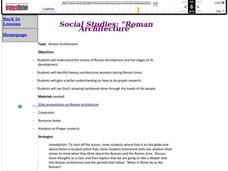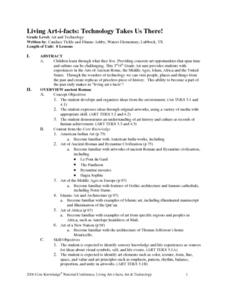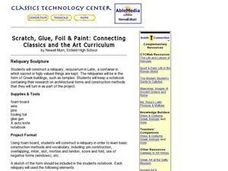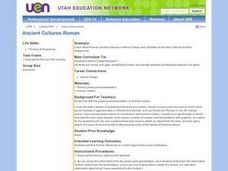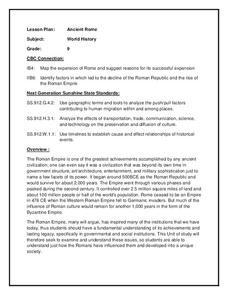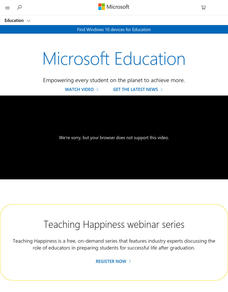Texas Education Agency (TEA)
Roman Architecture
Design an office fit for the gods. Individuals view a PowerPoint presentation on Roman architecture, its key elements, and famous structures. In groups, they design an office building incorporating the elements of Roman architecture.
Curated OER
Roman Art, Architecture, and Engineering
There is no better tool to help you explain art or architecture than an image-filled slide show. Classic Greek art, architecture, and engineering are all described with excellent visual examples and text which defines each form by its...
Curated OER
Rise and Fall of the Roman Empire
Your class can follow along with this PowerPoint to learn about all the triumphs and defeats that led to the rise and fall of the Roman Empire. Each slide contains key information related to Roman rule, law, religion, philosophy,...
Curated OER
Roman Contributions
A basic overview of one of the most powerful civilizations of all time, these slides don't quite do justice to the mighty Roman Empire. Slides featuring Roman contributions to modern society, such as the aqueduct and distinctive Roman...
Curated OER
Roman Archy
Third graders use Google Earth to examine Roman architecture. In this ancient Rome lesson, 3rd graders visit the noted URLs to look at examples of Roman architecture. Students work in teams to examine data about the structures.
Curated OER
How Does Roman Civilization Affect Me?
If used as a template for a class assignment in history, this resource could be a discussion piece. Students could discuss what they thought was useful, and anything they might add. Or, a teacher could add information to make this...
Curated OER
Roman Architecture
Pupils examine Roman architecture. In this ancient Rome lesson, students discuss some attributes of Roman architecture prior to conducting research on the use of classical Roman architecture in modern buildings.
Curated OER
Aqueduct Architecture: Moving Water to the Masses in Ancient Rome
Ninth graders compare ancient and modern technology in water transporting. In this lesson on the evolution of the aqueduct, 9th graders build a working aqueduct model and examine its components. They explain the importance and use of the...
Curated OER
What the Romans Did for Us.
What things can we attribute to the ancient Romans? Check out each of these images to find out. There are 26 slides, each containing a single image of Roman legacy that can still be seen today. Architecture, art, libraries, cats, and...
University of California
Bread and Circuses: Rome as a Site of Encounter
An intriguing lesson uses 12 Roman artifacts to explain Roman society and politics. Young historians view images of artifacts and learn how each one represents an aspect of Roman society. Academics also complete a hands-on activity to...
Curated OER
Roman Archy
Third graders research arch structures in Ancient Rome. In this Ancient Roman architecture lesson, 3rd graders use Google Earth and Google SketchUp to research seven important arches in Ancient Rome.
Curated OER
Ancient Roman Monuments and Timeline
While a terrific idea, this lesson in which learners create a timeline showing the date that a variety of buildings and monuments were built in Ancient Rome, requires resources teachers may not have. It requires the use of a Smartboard,...
Curated OER
Living Art-i-facts: Technology Takes Us There!
Students create living artifacts dealing with different times and cultures. They explore Ancient Rome, the Middle Ages, Islam, Africa, and the United States.
Curated OER
Vocabulary of Ancient Rome Grades 9-12)
Students define ancient Roman vocabulary using the dictionary writing sentences.
Curated OER
Scratch, Glue, Foil & Paint: Connecting Classics and the Art Curriculum
Students construct a reliquary using foam board, researching basic Greek and Roman architecture and basic construction methods. They record their research and information in an architectural journal.
Curated OER
Technology and Medicine
Students watch a video and continue with research of Ancient Rome and the quest for knowledge. They form expert groups to study one aspect of life in Ancient Rome and share with the rest of the class.
Partnership for Educating Colorado Students
Mayan Mathematics and Architecture
Take young scholars on a trip through history with this unit on the mathematics and architecture of the Mayan civilization. Starting with a introduction to their base twenty number system and the symbols they used, this eight-lesson unit...
Curated OER
The Fall of Rome and the Beginning of the Middle Ages
A major turning point in world history is the focus of this presentation. Rome has fallen, and with its descent comes the Dark Ages. With pictures, maps, and important information about the Middle Ages, this slideshow would be a great...
Curated OER
Ancient Cultures - Roman
Learners examine the Ancient Roman culture focusing on how they decorated their homes. As a class, they watch a PowerPoint presentation and complete an outline. Individually, they draw their own sketch of a Roman chair using...
Curated OER
Greece - Architecture
This presentation has a comprehensive description of the use of columns in Greek architecture. With pictures and diagrams, the presentation not only shows a comparison between the three types of columns, Ionic, Doric and Corinthian, it...
Miama-Dade County Public Schools
Ancient Rome
This resource outlines several general activities for a study of Ancient Rome, and includes guiding questions, a handout on the story of Romulus and Remus, and ideas for incorporating mapping and timeline activities into your review.
Curated OER
Friends, Romans, Countrymen...
Students research an important person or place from Ancient Roame and communicate their findings in a report that includes a map and illustration. Students may publish their reports online.
Pingry School
Houses in Pompeii
If you're teaching a unit on Roman architecture, this simple handout could be useful for generating your own questions, but may not be used as-is. It is intended to accompany a specific reading that is not referenced or included. Terms...
Curated OER
Travel Agent to the Ancient World
Students persuade others to visit ancient times. In this ancient civilizations lesson plan, students participate in a webquest that requires them to encourage others to visit ancient Greece, ancient Israel, Ancient Rome, ancient China,...


